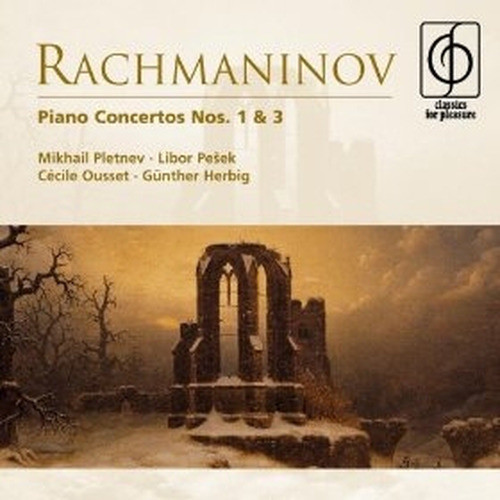
Rachmaninov: Piano Concertos Nos. 1 & 3
Cécile Ousset专辑介绍:Presumably Mikhail Pletnev is meant to be the "draw" here, but I didn't quite hear it that way. Both the ringing, weighted chords and the pingy, articulate filigree are evidence of the young pianist's already formidable virtuosity, but he doesn't seem to bring much to the F-sharp minor concerto beyond that. Were this not a "free-standing" recording - not made simply to complete a cycle - I'd have guessed that this score didn't particularly interest Pletnev; in any event, his performance didn't particularly interest me.
At least the score gets the advocacy it deserves from the podium, courtesy of the respected but underrated Libor Pešek, whose shipshape accompaniment rises to real distinction in the lyrical passages. I rather liked the way he "leans" expressively into the first movement's second theme without turning it heavy or sentimental, for example, and the dark, vibrant tone and shapely tapering of the analogous theme in the finale.
Cécile Ousset does a rather more interesting job with the blockbuster Third Concerto. If you subscribe to gender stereotypes, you'll think her treatment of some of the filigree - as early as 0:55 of the first movement - is "feminine", making the space to articulate each note within the overall running shape, eschewing the customary hurtling momentum. In other such passages, however, she conjures up the expected "witch's cauldron," and most effectively. She also fills out the big chords with massive, ringing tone - the finale's first subject, in fact, verges on the clangorous, while her rendition of the "choppy" version of the second theme thumps a bit. But her accomplished performance yields little - in musicality, style, or scale - to those of the male weightlifters.
Günther Herbig elicits a homogenized orchestral blend - similar to the sound of his Central European orchestras - from the Philharmonia, against which he draws the important motifs in clear relief. At the same time, he's attuned to the nervous, obsessive-compulsive strain that dominates much of this score, providing much of its forward impulse.
At budget prices, the conducting makes this a worthwhile acquisition, though if you're looking specifically for the F-sharp minor concerto, I'd go with Ashkenazy (Decca), from his 1970s cycle with André Previn and the LSO.
-- Stephen Francis Vasta
